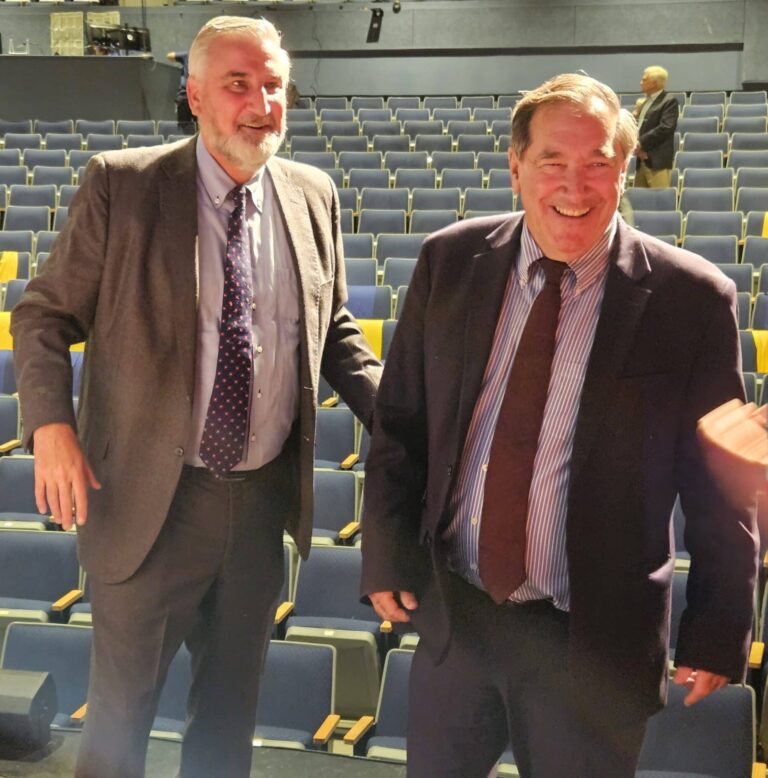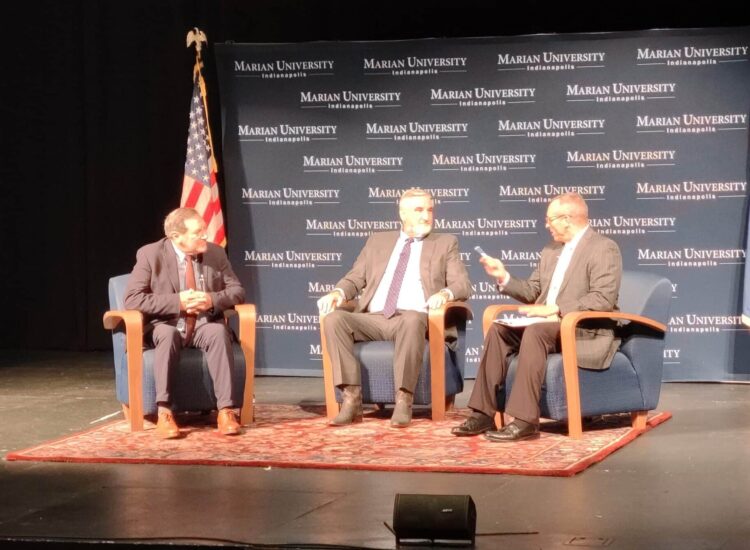
By Marilyn Odendahl
The Indiana Citizen
September 26, 2025
Former Indiana Gov. Eric Holcomb, a Republican, and former U.S. Senator from Indiana and U.S. Ambassador to the Holy See Joe Donnelly, a Democrat, shared the stage Thursday evening at Marian University in Indianapolis to discuss leadership, civility and commitment to public service.
Both held elected office at pivotal moments in U.S. history. Donnelly served on Capitol Hill during the 2007-2009 Great Recession, when he was a congressman (before becoming a senator), and Holcomb, as governor, led Indiana through the 2020 global pandemic. Reflecting on their turns in leadership in difficult and uncertain times, Donnelly and Holcomb said they often learned and gained guidance from their constituents.
“I always found in the toughest of times, no matter if you were in a small, tiny, one-dot town or a big city, usually the citizens were immediately ahead of what the state was going to do,” Holcomb said. As an example, he pointed to the arrival of the refugees from Afghanistan in September 2021, when, he said, churches, universities and private citizens were helping before the state even acted.
“I think being … very connected to the citizens and their heartbeat is very instructional and paramount to whether you’re successful or not,” Holcomb said.
Donnelly concurred. He recalled being in Washington, D.C., and wrestling with complex issues and tough decisions, but, he said, what would always help him was returning to Indiana.
“You’d come home and then you’d meet with folks at home and that would clear your head,” Donnelly said. “Then you’d go, ‘This is what makes sense.’”
The Hoosier politicians are now sharing their expertise and experiences with the next generation. Holcomb is a resident fellow at the Harvard Kennedy School Institute of Politics. Donnelly is teaching at the Keough School of Global Affairs at his alma mater, the University of Notre Dame.
Holcomb and Donnelly traveled to Indianapolis for the discussion that was part of the Richard G. Lugar Speakers Series, which is powered by the Penny and Jock Fortune Institute for Civic Leadership and Capitalism at Marian University. Moderated by Robert Vane, president of Veteran Strategies, the pair spoke for an hour to a crowd of college students, faculty, political staff, former officeholders, judges, and community leaders.
An edited excerpt of the conversation is provided below.

Q: You both worked in Washington, D.C. From Indiana, are our perceptions of the city and how it works fair or unfair?
Donnelly: I can give you the perspective from when I was there, which is, your word was your bond. If you said something, you kept your word. If you agreed you’d do it, then you did it. The goal was to work together to try to make life a little bit better. Now, do we agree on every issue? No, we don’t, but how do we make it so that at the end of the day, life is a little bit better? Some of my closest friends were the Republicans because they had the same goals and they had the same drive to make America stronger.
Holcomb: I mean what I’m about to say: I think we need to disagree more, but how (do) we disagree? Our founders and framers disagreed vehemently, but they understood their word was their bond and when they were in the chamber, they were there to negotiate, they were there to compromise. We would not be sitting here on this stage had they not had serious disagreements with one another but understood that’s what they were supposed to do.
Q: You mentioned college campuses which makes this event even more timely (because of) the assassination of (conservative activist) Charlie Kirk. How do we lower the temperature in a way that keeps the discourse alive?
Donnelly: It was a horrible event. People get in their silos, and the only information they get is something that supports what they believe. We need to talk to each other. We need to respect one another. We have seen so many awful things. We saw a legislator in Minnesota who was killed. We saw those young children in church in Minnesota killed. There’s like a loss of basic humanity, and what we need to realize is everybody (doesn’t) have to agree with you, but you have a God-given responsibility to respect one another and look out for one another. (Let’s) talk to one another, spend time with one another, begin to understand the humanity of one another, and maybe we can change this a little bit.
Holcomb: We have to model the conduct of which we seek and encourage (in) others. There are examples around, but with that alternative comes a lot of responsibility. It’s easy to say we’re not living in unprecedented times. We’ve been through the 1960s. We’ve been through a Civil War. We’ve been through two world wars. We’ve been at each other’s throats time and time again. But it’s not enough to say this is not unprecedented. We are at a point where, because of technology, (we) self-select our silos that we’re going to feel comfortable in. We have to have examples, operating examples, and organizations and associations and clubs on campus that show that there is a better way.
Q: Who are the two or three people you would consider mentors, the people who your life changed after you met them?
Holcomb: Rear Admiral Tindal. I would say some coaches along the way, who I thought were tyrants at the time, but they spoke the truth and they had high expectations and standards. I would say, certainly for those who know me in the political arena, (my mentors have been) (former U.S. Senator from Indiana) Dan Coats, and (former Indiana governors) Mitch Daniels and Mike Pence. I have been very fortunate. When I moved back to America, when I got out of the Navy, I went to work for a congressman. His focus and convictions were all about the Constitution, and he had the courage of few I’ve seen and I respected that (even though I) maybe didn’t agree 100% with him on issues. People who (have strong convictions) and are willing to share their opinion and learn from others and disagree in a better way, that’s who I have a lot of respect for and that’s who I’ve tried to learn from.
Donnelly: My dad. My mom died when I was young, so my dad raised five kids. He left in the dark for work, came home in the dark from work, and somehow it worked. Father Theodore Hesburgh, who was the president of the University of Notre Dame when I was there. Before I started my first day in Congress, he took me aside and he said when you’re there, here’s the deal, this is what I’ve done as president, I don’t do the easy thing, I try to do the right thing. So when you see something coming along, he said, keep that in mind.
Politically, (my mentors have been former Indiana Lt. Gov.) Joe Kernan from my hometown of South Bend, a Vietnam prisoner of war, extraordinarily good person, and (U.S. Senator from Arizona) John McCain, who was a wonderfully close friend.
Holcomb: I think something that Joe said, about doing the right thing. It sounds like a throw-away line when you hear it out in the public, but that’s very important. Not to sound negative, but at times, you may lose a friend over doing the right thing. When it gets really hot in the kitchen and you’ve been informed to the extent that you think that you, and only you, can make the decision and you’re comfortable with it, others won’t always agree with you and you have to be able to live with that, knowing that your conscience is clear and you’re doing the right thing.
Q: For folks like you who are seen, branded and lauded as reasonable, willing to listen, how important is it for you to keep doing what you’re doing tonight?
Donnelly: I think it’s real important, because you have to show folks there’s an alternative. For us, it’s our job to try to show there’s an alternative to a lot of what you see on television and that alternative works pretty good. I used to always say to the more liberal Democrats, who would go crazy sometimes on me, “Do you want 70% of something or 100% of nothing?” We have to realize we’re in this together, and you’re usually not going to get everything you want, but at the end of the day, we can have a stronger, better America that looks out for one another.
Holcomb: Huge, huge opportunity because so many people are dropping out, tuning out, disengaging. For those who choose to engage, it can have a profound difference and one reason why I will continue to look for ways to stay engaged. It may not be with that capital R by my name, who knows, but I will find ways to make that, as Joe just said, we’re in this to pursue progress, not some personal perception of perfection.
Q: What I’ve never heard an elected official, especially at the level at which you both served, I’ve never heard one say, “Faith plays no role in how I serve.” How did faith play a role in how you served?
Donnelly: Well, faith was always a part of my life. And you know, before some really tough stuff, I’ll never forget, the morning of the Affordable Care Act vote, it was on a Sunday, and right across from the Senate was St. Joseph’s Church, and I was at Mass there, and I just said, “Look, help me to do the right thing. Just keep an eye out for me today.” The faith you have is part of who you are and it’s a belief that, “You know, I don’t know everything, but boy, with faith, I can accomplish anything.”
Holcomb: I think it was my North Star. I maybe didn’t wear it on my sleeve. Throughout life you have different experiences where you’re moved, and I’ll share one today. I have been moved, goosebumps moved, and the experience stayed with me, days, years later, on a few occasions. If you’re fortunate enough to go to where the Sermon on the Mount was delivered at the Sea of Galilee and consider what was preached, and try to live a life that is aligned with those instructions, the Beatitudes, that will certainly, in my experience, frame it all for you – at the very essence, what are we here for?
Dwight Adams, an editor and writer based in Indianapolis, edited this article. He is a former content editor, copy editor and digital producer at The Indianapolis Star and IndyStar.com, and worked as a planner for other newspapers, including the Louisville Courier Journal.
The Indiana Citizen is a nonpartisan, nonprofit platform dedicated to increasing the number of informed and engaged Hoosier citizens. We are operated by the Indiana Citizen Education Foundation, Inc., a 501(c)(3) public charity. For questions about the story, contact Marilyn Odendahl at marilyn.odendahl@indianacitizen.org.